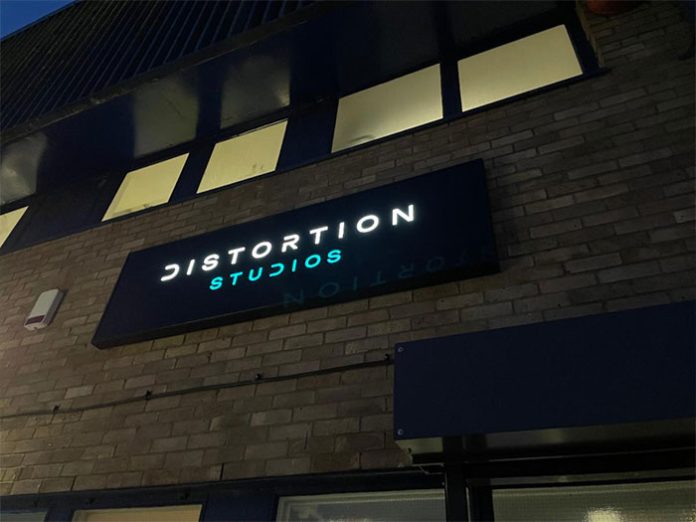Distortion Studios recently opened the doors of its new Bristol-based studio, backed by an in-house team of immersive digital arts specialists.
The space, home to a studio stage complete with the latest and most trusted virtual production technology, can be utilised by anyone looking to shoot virtual production content, as well as serving as a training and community hub.
“At Distortion Studios, we want to play a part in upskilling the next generation of industry professionals locally,” remarked Nick Diacre, Technical Director at Distortion Studios. ‘So, we’re looking to invite technical people in and run training in the space, alongside the usual studio hire. Remaining technologically agnostic was therefore important to us.”
Diacre first encountered SP by Stage Precision in the software’s early beta phase, which coincided with his exploration of XR setups using Disguise technologies during the COVID-19 pandemic. “SP slotted into a gap when we needed to take our productions to the next level and be more versatile,” recalled Diacre. “With SP we didn’t need to program custom code from scratch to build integrations anymore. This was a game-changer.”
Having been an avid user and contributor to the evolution of the software ever since, Diacre has designed the VP workflow at Distortion Studio based on Stage Precision. Distortion’s commitment to remaining platform-agnostic allows for adaptability to different tools and technologies based on project and client requirements. With Stage Precision at the centre of operations, Distortion Studios can switch between platforms, software, and systems.
The functionality of SP serves as a “Swiss army knife” for Distortion’s VP studio, capable of managing complex workflows from handling and visualising camera tracking data to controlling switches and calibrating lenses.
“Sometimes, being tied into a product ecosystem can be expensive and annoying – Stage Precision takes that problem away,” explained Diacre. “Because the software is platform-agnostic, there are no constraints on the technology we can use as there are many proprietary systems. This allows us to focus on creative execution rather than technical limitations or coming up with workarounds when someone wants to use a different camera.”
Diacre has found that the ability of SP to interface with all the leading VP and XR tools in the industry has gifted the team at Distortion with creative freedom and agility. “Unreal Engine, TouchDesigner, Pixera; all of these can be connected into a single interface in SP. The software just does its job and puts out the correct data,” said Diacre. “The way we see it, it’s a platform-agnostic pipeline for controlling our equipment.”
“SP gives you multiple ways to approach problems and data,” continued Diacre. “It creates a world where we don’t need to rely on programming. We can quickly debug stuff, take data out and verify it. We can control any parameter or function from SP.” For example, Distortion uses SP’s seamless integration with Stream Deck to control camera positions and lighting functions to create quick and easy system controls.”
Stage Precision’s Shield plug-in for Unreal Engine 5 is also in use at the studio. “Shield has become a potent tool for us, taking the legwork out of controlling Unreal,” said Diacre. “Our green screen workflow is elevated as Shield facilitates a closer control and monitoring of Unreal Engine. It’s not a complicated tool but it’s exactly what we need.”
Furthermore, Diacre and the team have cited the ongoing support from the Stage Precision team as a huge advantage. “I can’t imagine running a studio without it,” remarked Diacre. “It’s the lynchpin of our operations and gives us the high level of control, flexibility and methodology we need to run a successful studio. It feels like a golden age for VP right now, and for us as a studio to have a direct relationship with Stage Precision is incredible.”






